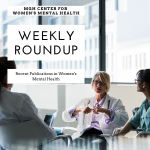Freeman MP, Farchione T, Yao L, Sahin L, Taylor L, Huybrechts KF, Nonacs R, Sosinsky AZ, Viguera AC, Cohen LS. J Clin Psychiatry. 2018 Jul 17;79(4).
This is a summary of a meeting with the FDA to discuss the challenges surrounding the labelling of drugs used during pregnancy and lactation.
Bauer AE, Maegbaek ML, Liu X, Wray NR, Sullivan PF, Miller WC, Meltzer-Brody S, Munk-Olsen T. Am J Psychiatry. 2018 Aug 1;175(8):783-791.
Family history of psychiatric disorders, especially bipolar disorder, is an important risk factor for postpartum psychiatric disorders. To assist in identification of women at risk for postpartum psychiatric disorders, questions related to female and male first-degree relatives with bipolar disorder are of the highest importance and should be added to routine clinical screening guidelines to improve prediction of risk.
Drozd F, Haga SM, Valla L, Slinning K. J Affect Disord. 2018 Dec 1;241:29-36.
Findings suggest heterogeneity among women in their depressive symptoms during the first year postpartum with a distinct set of risk factors associated with high-risk women. Complications after birth, elevated prenatal depressive symptoms, and previous mental illness predicted trajectory class membership.
Ruohomäki A, Toffol E, Upadhyaya S, Keski-Nisula L, Pekkanen J, Lampi J, Voutilainen S, Tuomainen TP, Heinonen S, Kumpulainen K, Pasanen M, Lehto SM. J Affect Disord. 2018 Dec 1;241:263-268.
In a group of 1044 women with no history of mental health issues, gestational diabetes was associated with an increased likelihood of having postpartum depressive symptoms (adjusted OR 2.23, 95% CI 1.23-4.05).
The association between body mass index and postpartum depression: A population-based study.
Silverman ME, Smith L, Lichtenstein P, Reichenberg A, Sandin S. J Affect Disord. 2018 Nov;240:193-198.
First trimester BMI measurements were available for 611,506 women. Low BMI (<?18.5) RRadj?=?1.52, [95% CI: 1.30-1.78] and high BMI (>?35) RRadj?=?1.23, [95% CI: 1.04-1.45] were associated with increased PPD risk. Women with a depression history had an increased risk with low BMI (RRadj?=?1.51, [95% CI: 1.17-1.95]).
Maleki A, Faghihzadeh S, Niroomand S. Psychiatry Res. 2018 Aug 17;269:102-107.
As is the case in mothers, high levels of depressive symptoms during pregnancy in the fathers predicts increased risk of postpartum depressive symptoms.
Sleeping problems during pregnancy-a risk factor for postnataldepressiveness.
Pietikäinen JT, Polo-Kantola P, Pölkki P, Saarenpää-Heikkilä O, Paunio T, Paavonen EJ. Arch Womens Ment Health. 2018 Aug 18.
After adjusting for potential confounding factors, including prenatal depressive symptoms (CES-D ??10), poor general sleep quality (AOR 1.87, 95% CI 1.21-2.88), tiredness during the day (AOR 2.19, 95% CI 1.41-3.38), short sleep ??6 and ??7 h, sleep latency >?20 min, and sleep loss ??2 h were associated with postnatal depression (all p?<?.050). Postnatally, after the adjustment for background characteristics, virtually all sleeping problems (i.e., difficulty falling asleep (AOR 7.93, 95% CI 4.76-13.20)), except frequent night awakenings per week or severe sleepiness during the day, were related to concurrent postnatal depressive symptoms.
Chen YH, Huang JP, Au HK, Chen YH. J Affect Disord. 2018 Aug 11;242:39-47.
Compared to first-time fathers, experienced fathers had a 70% higher risk of perinatal depression (odds ratio [OR]?=?1.7, 95% confidence interval [CI]?=?1.2-2.3) and anxiety (OR?=?1.7, 95% CI?=?1.2-2.6).
Adverse life experiences and common mental health problems in pregnancy: a causal pathway analysis.
Lydsdottir LB, Howard LM, Olafsdottir H, Einarsson H, Steingrimsdottir T, Sigurdsson JF. Arch Womens Ment Health. 2018 Jul 28.
According to this analysis, pregnancy does not appear to be a time of particular susceptibility to common mental health problems as a result of childhood abuse, but rather, these childhood experiences have increase the risk of adulthood trauma and vulnerability to mental disorders prior ot pregnancy.
Ip P, Li TMH, Chan KL, Ting AYY, Chan CY, Koh YW, Ho FKW, Lee A.
Infant Behav Dev. 2018 Sep 10.






Leave A Comment